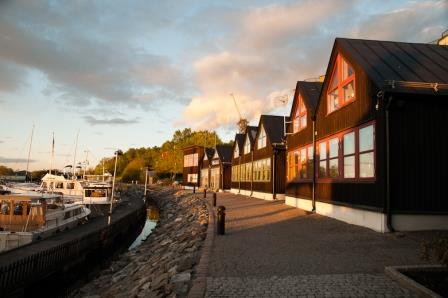From Nigeria to the USA to Stockholm: Geotraveler's Niche
 I go by “Lola” which is the short form of “Aralola” because my full name “Onoaralolaoluwa” is 15 letters long and takes up a lot of space on official forms. I was born in Nigeria where I lived for 15 years before moving to the US to start college. Since then, I’ve hopped, skipped, and explored many parts of the world, and I’m now living in Stockholm which I call home because both my loves are here – husband and daughter.
I go by “Lola” which is the short form of “Aralola” because my full name “Onoaralolaoluwa” is 15 letters long and takes up a lot of space on official forms. I was born in Nigeria where I lived for 15 years before moving to the US to start college. Since then, I’ve hopped, skipped, and explored many parts of the world, and I’m now living in Stockholm which I call home because both my loves are here – husband and daughter.
1. Why did you move abroad?
My first move abroad was as a teenager to the US to continue my studies. I come from a family of travelers and before then, we traveled often. Starting college at 15 was a scary intimidating experience but at the same time, it made me grow up really fast. I was out, done, and working as a professional programmer by 19.
My next major relocation was to Stockholm, Sweden because of love. I met my now husband in 2006 and for about 3 years we traveled back and forth, racking up frequent flier miles to keep our budding relationship alive. At the time, because I worked as a programmer, my job was very mobile so my company allowed me to work remotely a few months here and there from Stockholm.
I finally relocated in 2009.
2. How do you make a living?
Right now, I work as a professional writer and photographer for many publications and clients – http://www.akinmade.com. I recently signed on to be represented by National Geographic. Considering they represent about 300 photographers (only about 150 of us are active), it’s an exclusive opportunity I’m grateful for.
I also consult with a few tourism boards and agencies here in Sweden and write for publications like Nat Geo Traveler, BBC, and many more.
While working as a freelancer can be challenging because you’re living from project to project, you really can make it work for you by focusing on the right type of clients.
I’ve been making it work for me so far.
3. How often do you communicate with home and how?
I absolutely love WhatsApp because I’ve got three crazy sisters and we keep the conversation flowing all day long through its chat window. I try to call my parents at least once and Skype with my niece and nephew at least once as well. But I don’t think two days pass without me being on the phone with at least one of my sisters even if it’s just for five minutes.
4. What's your favorite thing about being an expat in Stockholm?
What I love about being an expat here is the chance to live in one of a few countries that actually “gets it” when it comes to flexibility and family time. Sweden offers up generous parental leave (1.5 years) per child as well as a small subsidy to help with supplies for your child. Businesses offer up 4-6 weeks paid vacation time to their employees.
And the irony is that our tax rate is roughly 30-32% percent. We get so much for what we pay and a lot of people think our taxes are way out there like 60% or more.
I also love that being an expat helps me hone my observational skills. I believe expats tend to be more observational than locals, and they appreciate even the most mundane of things a lot more.
5. What’s the worst thing about being an expat in Stockholm?
Living in that intermediate/middle space where you don't quite feel like you fully fit in yet you've integrated far enough into the culture to not be able to make excuses anymore. It can be a lonely and depressing space to be in. I actually wrote about the “awkward intermediary space” expats occupy so I’ll share it verbatim below here:
There comes a point in many expats' lives when they feel like their host country is out to get them paperwork-wise, and about two years ago, I'd been banging my head against some minor bureaucratic madness that does exist here in Sweden despite its candy sweet demeanor.
Why can't I keep my company name? Why is it taking 6 months to renew a permit? Why didn't you send me a notice if you needed extra documents?
However, one thing I've quickly realized is that comparing "what is" to "what used to be" never really works. Comparing US protocols to Swedish rules just doesn't jive. Come December, I'd have officially lived in Sweden for four years. Enough to know the language to function pretty well
Enough to know that you need to get your weekday shopping done before 5pm, and that many government employees take 6-8 week vacations too. Also enough to understand a lot of the nuances and intricacies of Swedish culture and just how closed it can feel if one isn't truly linked in somehow - i.e. married to or dating a local.
6. What do you miss most?
It’s been challenging finding affordable clothing designs and the styles and fashions I’m used to which I can easily find in the US so I do a lot of my shopping on trips back to the states. I love ethnic food especially Southeast Asian cuisine and Chinese and while there are some good restaurants in Stockholm, I tend to get my fix when I’m in London or traveling in larger cities instead. But overall, I do miss the proximity to my family because they’re spread out - from the US to Nigeria.
7. What did you do to meet people and integrate in your new home?
To be honest, Sweden can be a difficult place to make friends mostly because Swedes are reserved and really don’t “truly” let people into their lives even though it’s an open society. I’ve gained a lot of friends by de facto because I’m married to a Swede but I’ve also made a few friends mostly through my work as a freelancer and through my travels.
There are varying degrees of expat integration here and the deeper I learn about the culture, the more it's exposed. Looking over the last few years at some incredible offbeat places and amazing people like the Sámi I've gained access to here, it's been nothing short of a blessing in many ways.
I think fellow expats, immigrants, residents, and refugees here in Sweden who have no direct cultural links, who have to completely carve their own way from day one, who aren't inheriting friends, contacts, and family from a loved one are the ones who truly inspire me when a minor bout of expat paranoia hits.
I speak Swedish now so it was important for me in the beginning to sign up for free Swedish classes through the government’s subsidized “Swedish for Immigrants” (SFI) program. I’ve also taken an advanced class but I had to stop once I had my daughter so I’m planning on returning for more advanced studies this fall.
8. What custom/ habits do you find most strange about your adopted culture?
The strangest? People walking right by you without even acknowledging you with a “Hello!” or your presence. This is one of the basic human interactions I miss in the US – whether it’s done superficially or not. You have to acknowledge your fellow human beings. I think it is also what leaves a bad taste in the mouth of many immigrants and expats. Why would they want to willfully contribute to a society whose citizens won’t even acknowledge them with a simple “hello” on a daily basis?
It really is a deep-seated cultural habit that needs to be broken.
9. What is a myth about your adopted country?
Because of this really bad habit (I call it) of not saying hello to passing strangers, Swedes (and Scandinavians) tend to come off as cold and aloof which really isn’t true. They’re truly warm people and once you get to know them, you’ve got loyal friends for life.
Oh, and that Sweden is only filled with tall, leggy blue-eyed Blondes. Sure, there are some of those but it’s a lot more diverse than people expect and they’re usually surprised when they arrive.
10. Is the cost of living higher or lower than the last country you lived in and how has that made a difference in your life?
After finally wrapping my head around the fact that I will be paying $10 for a small sandwich for the rest of my time in Stockholm, I’ve been making lots of adjustments in how I spend money and what I spend it on. Stockholm’s cost of living is way higher than the US and a lot of those costs go to food, housing, and transportation.
I love good food so once in a while I do indulge but I don’t flit around Michelin-starred establishments just for fun.
Things I don’t really need to buy in Sweden like clothes and other personal style items, I buy those for myself when I go to the states a couple times every year.
11. What advice would you give other expats?
Finding local expat communities to hang out and commiserate with can be refreshing, avoid living in that bubble of comfort. Push yourself. Learn the language. Pursue knowledge of local culture. Interact with locals. Use expat life as an opportunity to add another rich layer of diversity to yourself.
12. When and why did you start your blog?
I’ve had a website in some form since 1997 but my Wordpress blog was started in 2007 mostly as a way of documenting my travels but now I’ve used it more as a professional space for sharing snippets of my work, samples of my photography, random life thoughts, and such. It’s been a  blessing because I’ve been able to get a lot of work through people finding my work and blog including this amazing opportunity with National Geographic Channel - http://lolaakinmade.com/2012/09/24/latest-news-heading-to-south-africa-with-national-geographic-channel/.
blessing because I’ve been able to get a lot of work through people finding my work and blog including this amazing opportunity with National Geographic Channel - http://lolaakinmade.com/2012/09/24/latest-news-heading-to-south-africa-with-national-geographic-channel/.
 Lola's blog, Geotraveler's Niche
Lola's blog, Geotraveler's Niche

Find out more about being an expat in Sweden with Easy Expat's
To be considered for an interview (as well as other articles), add your blog to BlogExpat!
Part of the EasyExpat.com adventure since 2008. Drink, Travel, Write